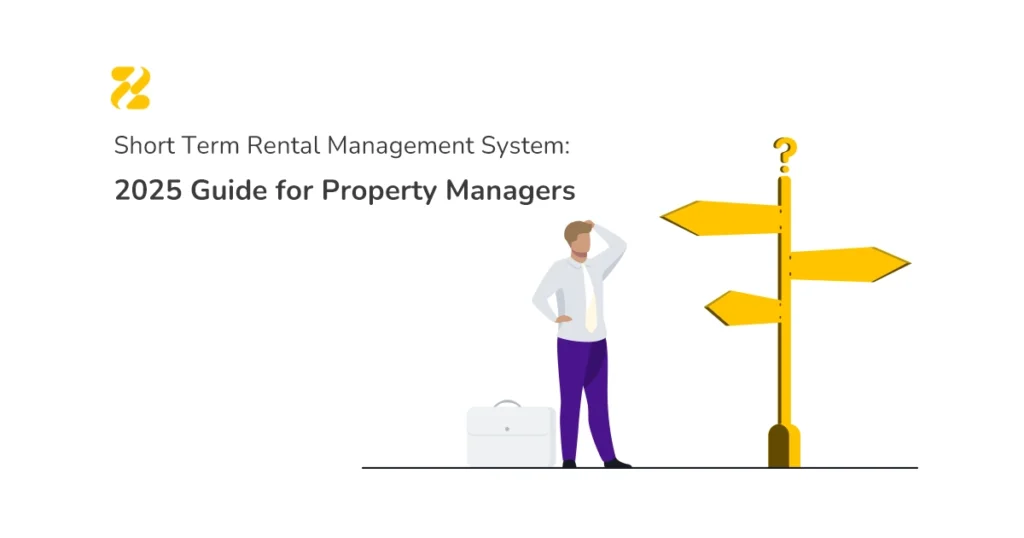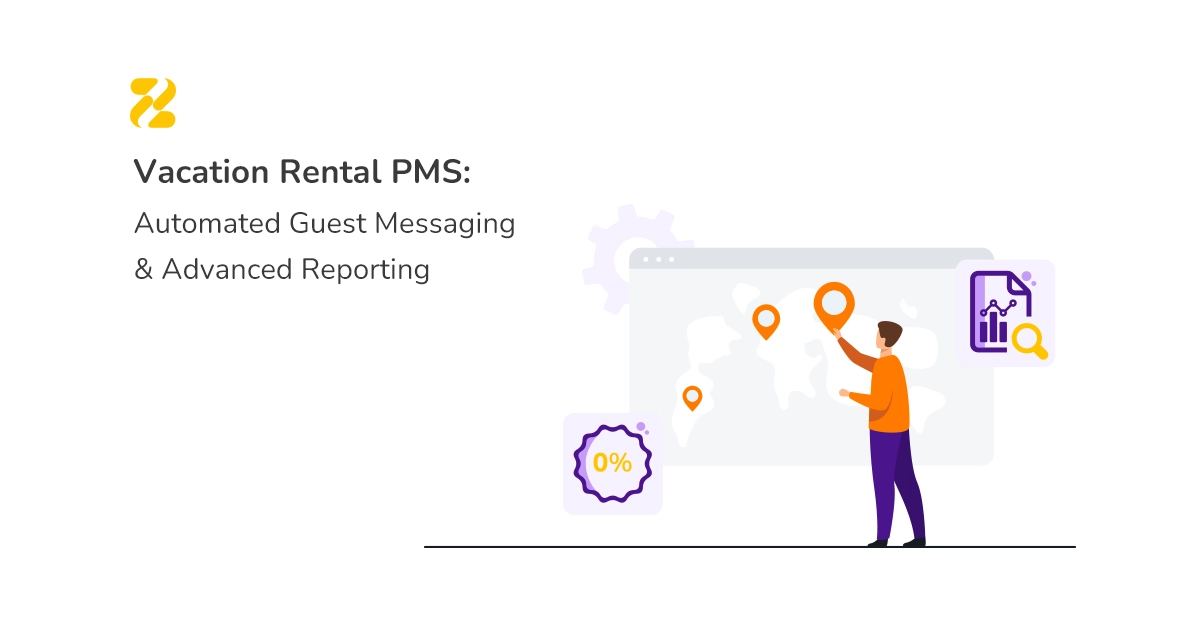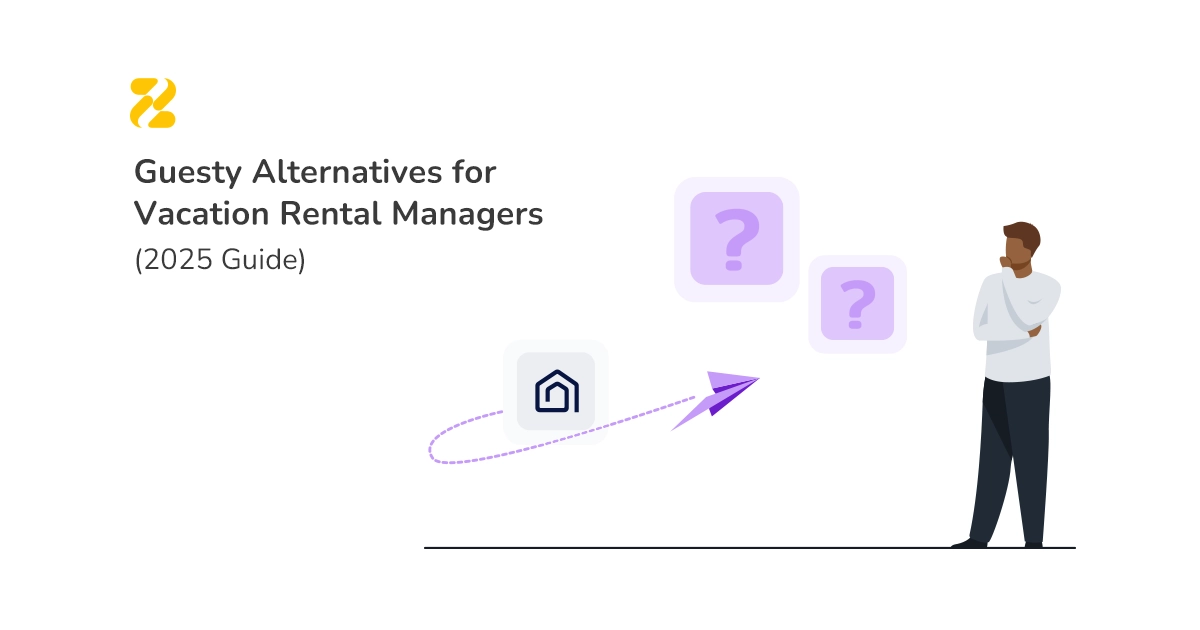Picture this: You’re juggling 30 properties across Airbnb, Booking.com, and Vrbo. Guest messages are flooding in from three different platforms, cleaning schedules are colliding, and you just discovered a double booking that’s about to ruin someone’s vacation. Sound familiar?
The global short-term rental market reached £111.6 billion in 2025 and is projected to grow at 10.9% annually to £393.3 billion by 2037, according to Research Nester’s comprehensive market analysis. The U.K. market alone is expected to reach £66.9 billion by 2033.
Yet many property managers are still drowning in manual processes that belonged in 2015, not 2025.
This guide reveals everything you need to know about short-term rental management systems in 2025 – from essential features that actually matter to choosing the platform that’ll transform your operation from chaotic to profitable.
Table of Contents
What Exactly Is a Short-Term Rental Management System?
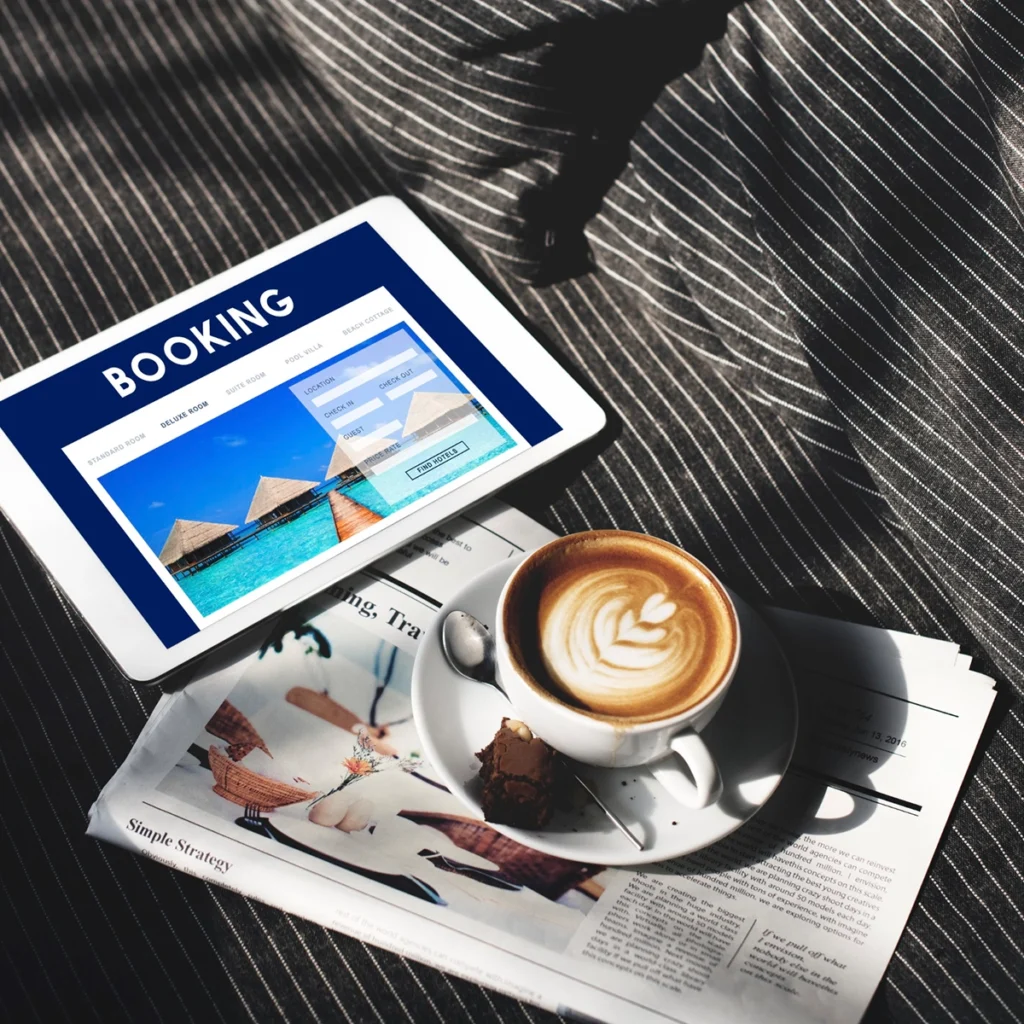
A short-term rental management system (also called a Property Management System or PMS) is your command center for running a vacation rental business. Think of it as the difference between juggling flaming torches blindfolded versus conducting an orchestra with precision.
Unlike basic hotel management software, vacation rental systems are specifically designed for the unique challenges of managing properties across multiple booking platforms and across multiple physical locations. They combine the operational oversight of traditional property management with the revenue optimisation and guest communication tools that modern short-term rental operators absolutely need to survive.
The core difference? PMS (Property Management System) focuses on operations like housekeeping and maintenance. Vacation rental software includes PMS features but adds channel management, messaging automation, and pricing tools tailored for short-term rentals.
Why 83% of Property Managers Can’t Afford to Ignore Modern Management Systems
Here’s a reality check that’ll hit harder than a negative review: According to KeyData’s 2025 Vacation Rental Industry Outlook, 83% of property managers reported changing prices at least once a week in 2024. If you’re still updating rates manually across multiple platforms, you’re not just inefficient—you’re hemorrhaging revenue.
The stakes have never been higher. The short-term rental market is increasingly competitive, with 76% of respondents in Hostaway’s survey reporting heightened competition in 2024. Meanwhile, 89% of operators worry about potential economic slowdown or decreased demand.
The Cost of Manual Management:
Consider Emma, who manages 45 units in Manchester. Before implementing a comprehensive management system, she was spending 6 hours daily just on basic coordination:
- 90 minutes updating calendars across platforms
- 2 hours responding to guest messages
- 1.5 hours coordinating cleaning schedules
- 1 hour reconciling bookings and payments
That’s 42 hours weekly on tasks that modern systems automate in minutes. At £25/hour for her time, she was burning £54,600 annually on manual processes—more than enough to fund a premium management system and hire additional staff.
The Implementation Reality: Emma got her entire operation up and running within days. By simply providing her Airbnb listing URLs, all property details, images, and descriptions imported automatically. A quick spreadsheet upload handled her existing bookings, and the guided channel integration connected her remaining platforms seamlessly.
The Revenue Impact:
But time isn’t the only cost. Emma’s manual pricing updates meant missing optimal rate adjustments during high-demand periods. A proper dynamic pricing system could have captured an additional 15-25% revenue during peak seasons alone.
With platforms shutting down or limiting features, like LiveRez, it’s crucial to know your options. Read about LiveRez alternatives here.
Essential Features That Actually Move the Revenue Needle
Not all management system features are created equal. After analysing successful operations from solo hosts to 200+ unit management companies, here are the features that genuinely impact your bottom line:
Multi-Channel Distribution That Actually Works
Your channel manager isn’t just about avoiding double bookings—though that’s crucial. The best systems provide real-time synchronisation across 200+ booking platforms, ensuring your properties appear in front of maximum eyeballs.
What separates premium channel management:
- Instant rate and availability updates across all platforms
- Platform-specific optimisation (Airbnb’s algorithm preferences differ from Booking.com’s)
- Automated listing optimisation for higher search rankings
- Channel-specific markup capabilities to account for different commission structures
Guest Communication That Builds 5-Star Experiences
52% of vacation rental property managers are already using AI, with key applications including dynamic pricing, guest communication (33%), and content creation (23%). But it’s not just about automation—it’s about creating personalised experiences at scale.
Modern automated messaging systems handle:
- Pre-arrival instructions customised by property and guest preferences
- Check-in procedures with smart lock integration
- Local recommendations based on guest profiles
- Post-stay review collection and response management
The result? Properties using comprehensive communication automation see review scores improve by 0.3-0.5 stars on average—a difference that dramatically impacts booking rates and pricing power.
Financial Management Beyond Basic Bookkeeping
Managing finances across multiple properties, platforms, and owners while maintaining accurate reporting is more complex than most property managers realise.
Premium systems like Zeevou’s trust accounting features provide:
- Automated profit calculations per property and owner
- Real-time expense tracking and categorisation
- Automated owner statements and payment distribution
- Multi-currency support for international operations
- Integration with accounting platforms like Xero
Operations Management That Prevents 3 AM Emergencies
The difference between amateur and professional operations becomes obvious when things go wrong. Comprehensive operations management features include:
- Automated cleaning schedules with housekeeper coordination
- Maintenance request tracking and vendor management
- Staff management with role-based access controls
- Integration with smart home technology and keyless entry systems
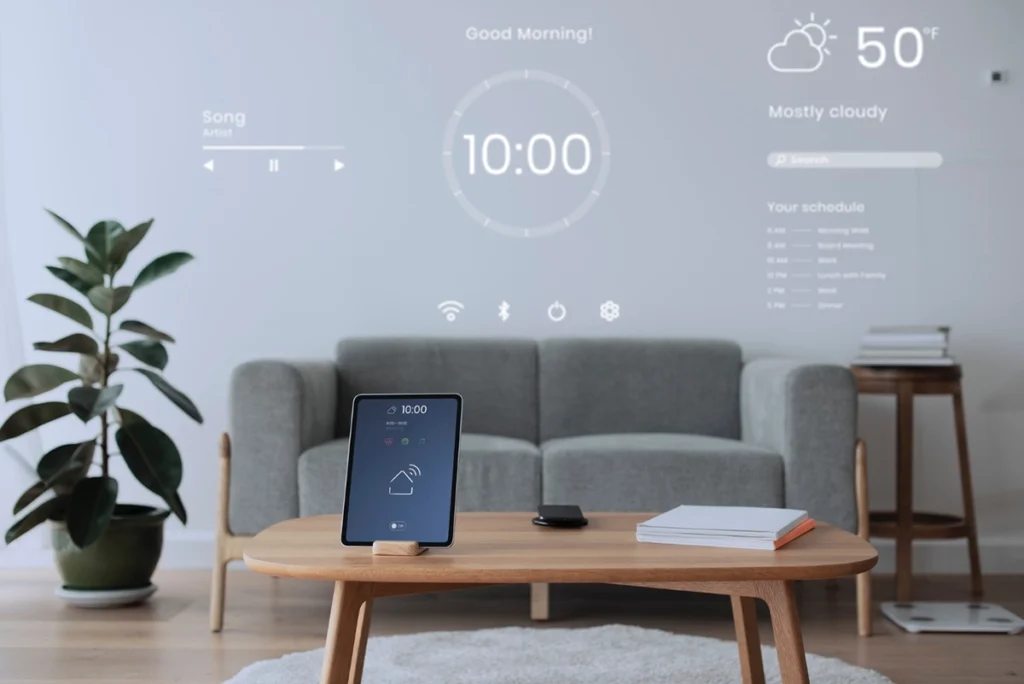
Revenue Optimisation: Where the Real Money Is Made
While operational efficiency is crucial, revenue optimisation is where modern management systems truly shine. Upsells generated up to £100-£120 per listing per month in extra revenue for operators using comprehensive systems in 2024.
Dynamic Pricing That Actually Responds to Market Conditions
Static pricing is revenue suicide in 2025. The most successful operators use sophisticated revenue management tools that consider:
- Real-time local demand patterns
- Competitive pricing analysis
- Historical booking data
- Special events and seasonal factors
- Guest booking behavior patterns
Rate Rules for Strategic Positioning:
Beyond basic dynamic pricing, advanced systems offer conditional pricing strategies. For example, The Grand Hotel case study from our success stories showed how targeted rate rules achieved:
- 30% increase in weekday occupancy
- 15% boost in midweek revenue
- Maintained premium weekend rates through strategic discounting
Direct Booking Websites: Your Commission-Free Revenue Channel
Hosts are turning to direct booking websites as part of a multichannel approach, allowing them to bypass third-party fees entirely. But success requires more than just a basic booking widget.
Professional direct booking websites include:
- SEO optimisation for local search visibility
- Mobile-responsive design with fast loading times
- Integrated booking engine with real-time availability
- Guest review integration and social proof
- Local content and area guides
Consider the Lovelady Shield success story: their direct booking website enabled a guest to save £300 compared to Booking.com pricing, while the property earned £210 more by avoiding the £510 OTA commission. Everyone wins except the middleman.
Choosing the Right System: A Framework for Decision Making
With dozens of management systems available, choosing the right one can feel overwhelming. Here’s a proven framework used by successful property managers:
Assessment by Portfolio Size
1-10 Properties (Solo Hosts): Focus on ease of use and essential automation. Look for systems offering:
- Simple channel management
- Basic automated messaging
- Straightforward booking calendar
- Reasonable pricing without complex fee structures
11-50 Properties (Growing Operators): You need scalability and more sophisticated features:
- Advanced channel management with markup capabilities
- Comprehensive guest communication workflows
- Financial reporting and owner management
- Integration capabilities with cleaning and maintenance services
51+ Properties (Enterprise Operations): At this scale, you need enterprise-grade functionality from a serviced apartment management system:
- Multi-user access with role-based permissions
- Advanced analytics and reporting
- API integrations for custom workflows
- Dedicated account management and support
Feature Prioritisation Matrix
Must-Have Features (Non-Negotiable):
- Multi-channel calendar synchronisation
- Automated guest messaging
- Financial reporting and owner statements
- Mobile app access for field operations
High-Value Features (Strong ROI):
- Dynamic pricing tools
- Direct booking website builder
- Automated review collection
- Smart home integrations
Nice-to-Have Features (Consider After Core Needs):
- Advanced analytics dashboards
- Custom reporting tools
- Third-party integrations beyond core needs
Implementation: From Sign-Up to Success in Hours, Not Months
The days of lengthy, complex system implementations are over. Modern platforms like Zeevou have revolutionised onboarding, allowing property managers to go from sign-up to fully operational in just hours or days, depending on portfolio size.

Quick Reference: Implementation Time by Portfolio Size
| Portfolio Size | Total Time | Key Focus |
| 1-5 properties | 2-4 hours | Basic setup and automation |
| 10-20 properties | 4-8 hours | Workflow optimisation |
| 50+ properties | 1-2 days | Enterprise configuration |
The Real Implementation Timeline
Initial Setup (1 hour):
- Create account and access your dashboard immediately
- Set up user profile and company details
- Configure basic settings and preferences
Property Data Import (15 minutes per listing):
- Import Airbnb listings instantly by providing listing URLs
- Automatically pull through images, descriptions, amenities, and all listing details
- Upload spreadsheet for bulk property import if managing multiple listings
- Verify and adjust property-specific settings
Booking Data Migration (30 minutes total):
- Import existing bookings via spreadsheet upload
- Verify booking details and dates
- Reconcile any data discrepancies
Channel Connections (10 minutes per listing per channel):
- Connect to Airbnb, Booking.com, Vrbo, and other platforms
- Automatic calendar synchronisation across all platforms
- Real-time sync without disrupting existing bookings
Financial Setup:
- Configure payment processing (10 minutes)
- Set up owner accounts and profit splits (5-10 minutes per listing)
- Input expense categories and tracking (10 minutes)
- Connect accounting software like Xero (10 minutes)
Communication Setup (1-2 hours):
- Pre-built automated messaging templates ready for immediate use
- Set up guest communication workflows
- Customise message triggers and timing
- Templates are tested as part of configuration
Operational Setup (10 minutes per staff member):
- Set up cleaning schedules and staff details
- Maintenance workflows are automated with no manual input needed
- Configure task management and assignments
Pricing Configuration:
- Base rates set automatically during listing creation
- Dynamic pricing integration if needed (5 minutes per listing)
- Rate rules and conditional pricing (optional, user-dependent)
Website Setup:
- Direct booking website builds instantly using imported content
- Customise branding and content (5 minutes)
- Booking engine configures automatically
- Set up SEO and analytics tracking (10 minutes)
The Reality: Timeline Based on Portfolio Size
For a typical operation:
- 1-5 properties: Fully operational in 2-4 hours
- 10-20 properties: Fully operational in 4-8 hours
- 50+ properties: Fully operational within 1-2 days
Users can be fully operational within days, and the time to go live is mostly limited by users having all the information required ready and organised rather than any system or onboarding support limitations.
The AI Revolution: What’s Coming in 2025 and Beyond
AI adoption in hospitality accelerated dramatically in 2024, and the implications for short-term rental management are profound.
AI Applications Already Impacting Revenue:
- Predictive pricing that anticipates demand fluctuations
- Intelligent guest communication that adapts tone and content
- Automated review response generation
- Fraud detection and guest screening
Emerging AI Capabilities:
- Voice-activated property management
- Predictive maintenance scheduling
- Dynamic upselling based on guest profiles
- Automated content creation for listings and marketing
The operators who embrace AI-powered management systems now will have a significant competitive advantage as these technologies mature.
ROI Analysis: Measuring Success in Real Numbers
Let’s talk numbers that matter to your bottom line. Based on analysis of over 1,500 property managers using comprehensive management systems:
Operational Efficiency Gains:
- 60-80% reduction in manual administrative tasks
- 40-50% decrease in guest communication time
- 30-40% improvement in cleaning and maintenance coordination
Revenue Optimisation Results:
- 15-25% increase in revenue per property through dynamic pricing
- 20-30% reduction in OTA dependency through direct bookings
- £50-£150 additional monthly revenue per property through upsells
The Air Host & Clean Success Story:
This operator managing 40+ units achieved:
- 50% reduction in manual workload
- Eliminated last-minute check-in issues
- Significant increase in direct bookings
- Improved work-life balance through automation
For a 40-unit operation, these improvements typically translate to £3,000-£5,000 monthly in additional profit—easily justifying management system costs of £15-£100 per unit monthly for larger operators (solo hosts typically pay £50-£300).
Ready to see these results for your portfolio? The operators implementing comprehensive vacation rental software today are capturing market share while competitors struggle with manual processes. Schedule your demo to discover how award-winning Airbnb management systems can transform your operation, or start your free trial to experience the difference immediately.
Making the Strategic Choice: Platform Comparison Framework
When evaluating management systems, consider these strategic factors:
Integration Ecosystem
The best systems don’t try to do everything—they excel at core functions while integrating seamlessly with specialised tools. Look for platforms that connect with:
- Dynamic pricing tools (PriceLabs, Beyond Pricing)
- Smart lock systems (RemoteLock, August)
- Cleaning management platforms (Turno, Breezeway)
- Accounting software (Xero, QuickBooks)
Scalability and Support
Your management system should grow with your business. Evaluate:
- Pricing structure that makes sense as you scale
- Support quality and availability
- Training and onboarding processes
- Community and educational resources
Data Ownership and Portability
Ensure you maintain control of your business data:
- Ability to export complete booking and guest data
- API access for custom integrations
- No vendor lock-in clauses
- Clear data retention policies
Future-Proofing Your Operation
By the end of 2025, Gen Z and millennials are expected to account for around 75% of Airbnb’s traveler base. This demographic shift demands management systems that can adapt to evolving guest expectations.
According to a market size report from IndustryARC, the AI market in the travel and hospitality sector is projected to nearly double its value to reach over $1.2 billion by 2026, with automation tools for lodging and accommodation leading the transformation.
Emerging Guest Preferences:
- Contactless check-in and communication
- Sustainability and eco-friendly practices
- Authentic local experiences
- Flexible booking and cancellation policies
Technology Trends Shaping the Industry:
- Voice-controlled smart home integration
- Blockchain-based identity verification
- IoT sensors for predictive maintenance
- Virtual reality property previews
Choose a management system with a track record of innovation and regular feature updates to stay ahead of these trends.
Getting Started: Your Next Steps
The short-term rental industry isn’t slowing down. Only operators with professional systems will capture their share of this growth.
Here’s your action plan:
- Audit Your Current Processes: Document time spent on manual tasks and identify your biggest operational pain points
- Define Your Requirements: Use the framework in this guide to prioritise features based on your portfolio size and business goals
- Start Your Free Trial: Modern systems like Zeevou offer instant setup—provide your Airbnb listing URLs and existing booking data to be operational within hours
- Calculate ROI: Project the revenue gains and operational savings to justify your investment
- Scale with Confidence: Once you experience the efficiency gains, expand your use of advanced features like dynamic pricing and direct booking websites
The property managers thriving in 2025 aren’t just running vacation rentals—they’re running technology-powered hospitality businesses. The question isn’t whether you need a comprehensive management system; it’s whether you can afford to operate without one.
Ready to transform your short-term rental operation from reactive to strategic? Modern platforms make getting started effortless—you can be fully operational within days by simply importing your Airbnb listings and uploading existing booking data. Schedule a demo to see how the right management system can unlock your property portfolio’s full potential, or start your free trial today and experience the transformation firsthand.
Don’t let another day pass watching competitors capture revenue while you’re stuck in manual processes. Book your demo now and join the thousands of property managers already winning with professional management systems.
Frequently Asked Questions
What’s the difference between a PMS and vacation rental software? A: A PMS typically focuses on operational aspects like housekeeping and maintenance. Airbnb management software includes PMS features but adds channel management, automated guest communication, dynamic pricing, and revenue optimisation tools specifically designed for short-term rentals.
How much should I expect to pay for a management system? A: Pricing varies significantly based on portfolio size and features. Solo hosts typically pay £50-£300 monthly, while larger operators managing multiple units may invest £15-£100 per unit monthly depending on the feature set and level of service. The key is calculating ROI based on time savings and revenue increases.
Can I switch systems without losing bookings? A: Yes, absolutely. Modern systems offer instant data import capabilities and real-time synchronisation. You can import existing bookings via spreadsheet upload and connect channels immediately without any disruption to current reservations.
Do I need a direct booking website if I’m already on OTAs? A: Absolutely. Direct bookings eliminate 10-20% commission fees and give you complete control over guest relationships. Successful operators typically achieve 30-50% direct booking rates with proper website and marketing strategies.
How quickly will I see ROI from a management system? A: You’ll see operational benefits immediately—within hours of setup. Revenue improvements typically show within 30-90 days as dynamic pricing and automation take effect. The Air Host & Clean case study showed 50% workload reduction and increased direct bookings within the first month of implementation.
Image by pch.vector on Freepik.


